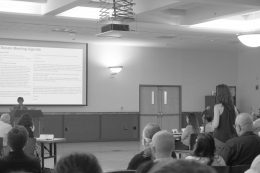
Last Tuesday, three faculty members at Binghamton University presented a letter to the Faculty Senate criticizing the administration’s response to last semester’s Peace Quad encampment and other student protests. Just before the start of the fall semester, Provost Donald Hall sent a University-wide B-Line recognizing strength in diversity and the value of facilitating discourse on campus while reiterating university policies. Hall wrote, citing Binghamton’s Distinguished Speaker Series’ core values, “Indeed, our values call upon us to ‘encourage faculty, students and staff to ask unexpected questions, foster open dialogue and develop innovative solutions to important problems.’”
We commend faculty members’ solidarity with student protestors of all beliefs and their commitment to freedom of expression. Unfortunately, on Binghamton’s campus, freedom of expression is lost to empty statements, and bureaucratic procedures stifle, instead of amplify, opportunities for the productive exchange of ideas, whether that be in protest or in classrooms. The values that the administration claims to be faithful to cannot prosper under current university policy. We must reckon with the administration’s contradictions as we anticipate student protests this school year and build the campus we deserve.
Empirically, the administration’s response to protests has been one of defense, devaluation and policing. As Associate Professor Surya Parekh points out, students in the encampment last spring were met with ultimatums — meetings with administrators in exchange for an end to the protest. Administrators did not arrive at the Liberated Zone with the initial intention nor expectation of open dialogue themselves.
Meanwhile, students are passionate about sharing their voices, and many events of last year proved this. Last semester, the Student Association Congress voted on a Boycott, Divestment, Sanctions resolution. The room was filled with voices, which quieted to listen to their fellow students. The meeting fostered real conversation between students from opposing sides of an issue, so much so that it lasted nearly five hours on a school night. It says a lot about our University’s administrators if student leaders are better equipped to organize and foster open dialogue and a respectful debate than they are.
The faculty members also expressed concerns over the University’s use of student conduct violation threats and a heavy police presence during the encampment. The encampment communally decided to disassemble in proactive protection of the “largely marginalized makeup of the encampment … who face a magnified threat of police brutality and disproportionate legal consequences.” Faculty members are right to be troubled by the precedent the University has set. It’s even more concerning that the administration clearly does not trust its students and it is the students who made the choice to protect and uphold the rights of their community in lieu of the police.
Administrators’ distrust is further exemplified by place, time and manner policies concerning protest, which are not unique to BU. Protests are held to a 12-hour limit, must be coordinated with campus police and preemptively disclose its time, place and intended purpose. While student safety is important, student protests have largely been peaceful. The imposition of guidelines and demand for transparency in anticipation of our campus values being violated suppresses the spirit of protest and, in certain cases, the ability of students to take a strong stance against University policies — ignoring that protests must be disruptive to an extent for change or an “innovative solution” to develop.
Unexpected questions cannot be radical if they are expected, open dialogue cannot exist if it is policed and innovation cannot flourish if we’re told to think and act inside the box — students cannot express themselves freely and impactfully if the administration continues its hawkish, ready-to-fight attitude. Telling students how and when they can practice expressive activity or subjecting them to tedious scheduling and sign-up processes restricts the values the University wants to foster. At some point, the “how” in students’ freedom of expression becomes fundamental to that very right.
This right to expression must be extended to our faculty members, who are also bastions of our campus values. Hall wrote to faculty this summer, recognizing their academic freedom, but only on matters concerning their subject. He claimed that it is not their right to speak out on unrelated controversial issues in their classroom. Promoting political and civic engagement on campus is meaningless if students cannot discuss and apply their findings and passions in the classroom.
The faculty at BU have continuously served as mentors to students, and they inspire us with their own pursuits. The irony in Hall citing the Distinguished Speakers Series for cutting-edge individuals is the administration’s reluctance to invest in their own faculty and students, expecting innovation and creativity without providing the means to do so.
University policies are not receptive to student and faculty needs nor are they emblematic of our values. We deserve a campus that is safe, encouraging and faithful to our freedom of expression — faculty have stood up for our values, and the administration must keep their promise to stand up as well.
The staff editorial solely represents the majority view of the Pipe Dream Editorial Board. It is the product of discussions at regular Editorial Board meetings.


